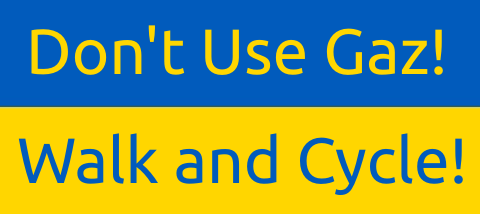Britain's current infrastructure is at breaking point. Roads are impossibly congested, travel is slow and frustrating, and pollution levels exceed legal limits. What we need is sustainable transport. Sustainable doesn't just mean eco-friendly, it also means affordable (both to the state and individuals) and scalable.
In the 1950s Britain used to be a quiet place. It is true that economic activity was less then, but the elephant that we invited into the room is the private motor car. The motor car was seen as the way everyone would get around in an exciting future. What no-one stopped to consider before the consequential road building got under way, is what impact that would have.
- Private cars take up a lot of space, both whilst moving and when parked, yet they typically only ever carry one person. The corollary of this is that roads take up a lot of space, yet despite this it only takes one person in one car to completely block one lane of a typical carriageway, bringing everyone to a halt over a potentially large area. The obvious answer is to take more space to build ever greater capacity, but in urban areas we have no more space, so the choice is between tweaking things to let through a few more vehicles, or knocking down buildings. Either way there are limits, and either way it just encourages more people to make journeys by car. Thus despite the fact that we have by a large margin yet to achieve the 1960s dream of (almost) everyone owning a car and using it to get about, congestion remains a major problem. Be under no illusions that the cause is the private motor car, not all the other vehicles that use the road. At a meeting in 2014 to discuss the Priory Road junction on the A38 in Edgbaston (a junction that is operating at its capacity limit), we learned that of the tens of thousands of vehicle movements at this junction every day, less than 200 were buses, despite the A38 having a frequent bus service.
- All motor vehicles are polluting, both in terms of traditional pollutants (such as hydrocarbons, particulates, and NOx), but also in terms of noise and greenhouse gas emissions (specifically carbon dioxide). The automotive industry has made great advances in technology that reduces pollution, but unfortunately this has been partly compensated for by the increase in use of excessively large private cars, and it is still nothing like enough to bring chemical pollution levels within legal limits. Battery-electric vehicles simply transfer the pollution problem elsewhere, and whilst that is beneficial in urban areas, overall it does not represent a reduction in pollution if the charging power comes from hydrocarbon sources. Renewable energy has insufficient capacity to provide everyone with the energy needed for an electric car, whilst nuclear fission creates a major problem with hazardous waste (especially if things go horribly wrong, as they did at Chernobyl and Fukushima).
- Cars are very expensive to own and run. Many people go into debt so they can run a car. Increasingly people simply cannot afford to do so. Young people in particular find that insurance is way beyond their means. Roads are also very expensive to build and maintain, and since we can't afford that maintenance many of Britain's roads are in an appalling condition. Roads are a costly resource that should not be squandered on things that can be better achieved by other means.
Push Bikes is not anti-car. Indeed most cyclists also own a car. What Push Bikes is for is a significant reduction in car usage to the point where it becomes sustainable. Since people still need to get around, that begs the question "what is the alternative?". It should be obvious that Push Bikes promotes cycling as an alternative, but assuming that's all we believe in would be a gross oversimplification. Push Bikes promotes cycling as a key feature of sustainable transport, but the traditional bicycle is just one aspect of what we promote. The infrastructure section of this website will describe those many aspects, along with our policy on how sustainable transport can be achieved.


